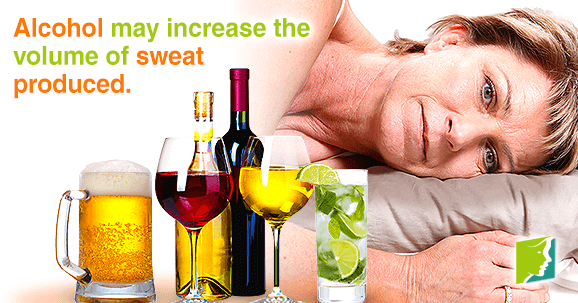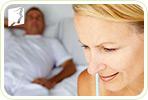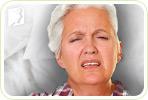It's common for women approaching menopause to routinely wake up drenched in sweat. Night sweats happen because of hormonal imbalances that occurs between the ages of 45 - 55. Lack of estrogen causes the hypothalamus to falsely detect an increase of body temperature, and subsequently produces sweat to cool down. However, lifestyle factors, such as alcohol consumption, also influence the nature of night sweats. Read to learn how alcohol may be intensifying your night sweats and how to avoid this.
Alcohol-induced Sweating
When you consume alcohol, it's metabolized in the liver, where enzymes break down most of it so cells can absorb the molecules. This happens at a rate of approximately a 12-ounce serving of beer, or five-ounce serving of wine, per hour. If consumed at a higher rate, alcohol accumulates and is passed out of the body through urination and the sweat glands. Therefore, if you're already prone to night sweats, alcohol may increase the volumes of sweat produced, because your sweating is triggered by two causes: hormonal imbalance and the metabolism of alcohol.
Alcohol-induced Sweating and Other Disorders
Be aware that alcohol-induced sweating can also indicate binge-drinking and alcohol dependency; if you're concerned that either of these issues apply to you, talk to your doctor.
Alcohol Odor and Night Sweats
If you're drinking in the evening at a higher rate than your body can metabolize, blood vessels will continue to dilate after you stop consuming alcohol, causing the body to produce sweat during the night to flush it from your body and regain a normal body temperature. This is unpleasant for you, and - if you share a bed - for your partner.
How to Stop Alcohol Intensifying Night Sweats
Sleep in a cool room and ensure your nightwear is loose, and made from a fabric that allows the skin to breathe (e.g., cotton) to reduce discomfort caused by night sweats. Avoiding excessive consumption of alcohol before going to bed will allow your body sufficient time to metabolize alcohol molecules consumed earlier in the evening and prevent sweating in the night. Drinking water after drinking alcohol will also maintain a low body temperature and flush alcohol from the body via urine as opposed to through the sweat glands.
In order to prevent night sweats brought on by menopausal hormone imbalances, being aware of the impact of alcohol is important. Although not necessary to cut alcohol from your life completely, knowing its effect and how you can control it could prevent more sweating from becoming an issue for you and your partner.
Sources
- National Health Service UK. (2014). Symptoms of the menopause. Retrieved December 15, 2014, from http://www.nhs.uk/Conditions/Menopause/Pages/Symptoms.aspx
- National Institutes of Health. (2013). Sweating. Retrieved December 15, 2014, from http://www.nlm.nih.gov/medlineplus/ency/article/003218.htm
- National Institute on Alcohol Abuse and Alcoholism. (n.d.). Alcohol Metabolism: An Update. Retrieved December 15, 2014, from http://pubs.niaaa.nih.gov/publications/AA72/AA72.htm




